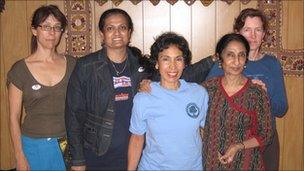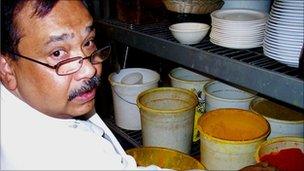Indian Americans reflect on life in US
- Published
As US President Barack Obama prepares to visit India, BBC Radio 4's Americana programme spoke to first and second generation Indian Americans about their perspective on life in the United States.
Nilimma Devi - Choreographer

Nilimma Devi (2nd from right) came to the US as a 25-year-old bride
I was born in pre-partition India, Peshawar to be precise. I came to this country [in the 1960s], a 25-year-old bride, to the Midwest, Madison in Wisconsin.
When I came to this country there was electricity, there was food. Things that were a rare commodity [in India] at that time, they were in such abundance. My first thing was: "I want a dishwasher and a car."
My neighbours were appalled. "This simple girl from India wants a dishwasher?" I didn't think I would have to walk two miles to get sugar and salt. So I wanted those two things. It was 1968-69, so it was all good.
I've always thought I would go back to India and perhaps settle there, retire there [but] there are things I can bring to India and America both. As an artist, I can take something beautiful of America to India, and bring something very endearing of India to the US - a sense of spirituality, music, religion, divinity and how that becomes relevant today.
Then I can bring new ways of looking at life, at culture, from US back to India - the spirit of innovation, the spirit of looking at the world in wonderment - not that other countries don't have it, but its more abundant here, I think, in the US.
That vibrancy comes from the many cultures who come here and bring many angles, many views of looking at life. To be exposed to those, it begins to stimulate you, your own energies, at another level, where you just become richer for it. It doesn't dilute your own essence, it just makes you richer.
Gabriel D'Coasta - Curry chef

Gabriel D'Costa says his daughters love living in America
I [was born] in India, Calcutta. I am a chef for different restaurants in Maryland. We cook the naan and some tandoori items, curry items, goat curry. We neither make it very mild or very spicey. I always try my best to give typical Indian food.
I have my family here, my wife and three daughters. We are now American citizens. In my family my wife doesn't work. She takes care of my children, the food, the studies, any teachers meetings at the middle school and high school, she is there too.
Here I have noticed that parents are not that interested. Husband and wife, both of them are working. I think in America that is lacking.
My daughters they love this country, they don't want to go back to India. They say we are now American, for America, by America. Even I say it too, because I have everything in this country-a good job, a good house, good everything.
Sreeja Nair - IT Professional
I am pretty sure that when someone first looks at me, I might be "a brown person who just happens to work in IT" and then I open my mouth. I think it's pretty accurate to say that I am direct person. I don't mince words... but I am tactful and diplomatic, and that might break a stereotype.
There are definitely parts of me being Indian that put me at an advantage. My parents were definitive about the fact that I would go to college for example. It didn't strike me until I was in grade 12, that there was an option to not go to college. "What do you mean that is an option? What do you mean I can take a year off and travel?"
Having said that, what they put into me was great work ethic, the need to understand material the need to learn, the need for continual improvement. That has definitely put me at an advantage.
The concept of a predetermined career being chosen for you is an Indian concept. The concept of having the freedom to find yourself and be a stronger person for taking the time to know who you are is more of an American concept.
Luckily, as a person in-between both these worlds I've had both the opportunity to be told what was thought to be an advantage to me, while at the same time taking the time to find out who I am, whether I would be happy in that. That, I think, is a hybrid of that of both having an Indian background but growing up in a North American culture.
I think if people looked my parents they would be more likely to know that they are Indian. I think if people looked at me they would either be thoroughly confused or consider me to be a "third culture kid," someone who can understand a variety of cultures and contribute in that way to the rest of the world.
You can hear more in the latest edition of Americana on Sunday 7 November at 1915GMT on BBC Radio 4 FM or online.
- Published3 November 2010